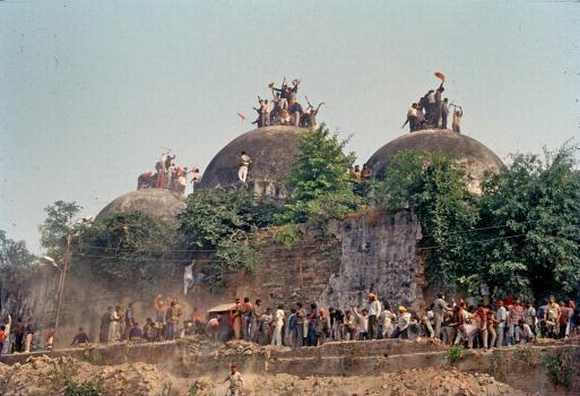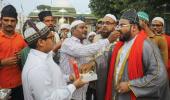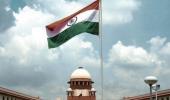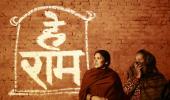'He failed to foresee that the campaign of hatred need not be continuous; a sporadic, scattered campaign is enough.'
'What was important is to keep the pot boiling, not let it overflow like happened during the masjid-mandir days,' notes Saisuresh Sivaswamy.

In last year's blockbuster Telugu film Bharat Ane Nenu (I, Bharat), actor Mahesh, who becomes chief minister after his incumbent father's sudden death and tries to clean up the system, asks an old school politician about the problems that remained to be solved. 'Arre, if we solve all the problems, why will the people elect us?' comes the reply.
The truly cynical among us evince more than a chuckle at the remark, realising that there is more than a modicum of truth in that throwaway quip. The discerning would see in it the Bharatiya Janata Party's dilemma post the Ayodhya verdict.
A festering problem is so much more a vote-catcher than one that has been removed. And then prime minister P V Narasimha Rao, that wily politician among politicians, knew it only too well.
When he saw the BJP's parliamentary strength leapfrog from a mere 2 in 1984 to 89 in 1989 to 120 in 1991, he knew the issue that propelled the party at such speed needed to be solved.
At that time, the issue was not building of a Ram temple.
'Mandir wahi banaayenge' was the secondary slogan then.
For the corollary to happen, the previous statement had to be fulfilled.
Which was, 'ek dhakka aur do, Babri masjid tod do'.
So did he deliberately let it happen, as his detractors have been alleging? Did he not do enough to prevent the demolition?
The accusers have been given a free run, but in an interview to M D Nalapat a few months before his demise, Rao offered his version (external link) of recent history, and it deserves to be read.
But the Congress party, which now has gone out on a limb to welcome the Supreme Court of India's verdict handing over the entire 2.77 acre disputed area for the Ram temple, then found Rao's 'inaction' in protecting the masjid so antithetical to its core values that arguably India's most remarkable prime minister has been excised, and exorcised, from the party's pantheon.
It is as if the five years of Rao's minority government simply did not happen in the Congress party's accounts.
Rao remains vilified too by large sections of the secular liberal class who, however, conveniently forget that before Rao, there was another Congress prime minister who played a more diabolical role in fanning the flames that engulfed swathes of the country over the masjid-mandir dispute.
It was Rajiv Gandhi, and but for his misdeeds on the communal front I daresay India would have been a much better place today.
Today's generation of speed readers would find it hard to believe that he was the prime minister on whose watch the locks of the Babri Masjid were opened and Hindus were allowed to pray inside.
And that in 1989 he launched the Congress's election campaign by organising the shilanyas, the foundation stone laying ceremony, for the Ram temple. And that in 1991, he launched his election campaign from Faizabad, UP, which housed Ayodhya, by promising Ram Rajya.
Because for large sections of Indians a grandson of Jawaharlal Nehru could do no wrong, even when history shows otherwise, we are happy to pin it all on the unpedigreed Rao who, in true Congressman fashion, carried his hurt, and silence, with him to his pyre.
To be fair to Rao, he remains the only prime minister to have promised that the masjid would be reconstructed at the same spot.
Rao may or may not have known of the plan to pull down the mosque on December 6, 1992. He may or may not have done enough to protect it. But it is unlikely the astute Rao would have shed copious tears over the desecration of the shrine which the Supreme Court has now called illegal.
For he knew the BJP's electoral winnability came not out of any love for Ram, but out of hatred for the Babri Masjid. Remove the problem, and the winnability too goes.
Rao's calculation would have showed that with the Babri Masjid reduced to dust, the BJP's emotive pitch would have lost its punch.
The popularity of Shiva the destroyer over Vishnu the protector or Brahma the creator perhaps is a sign that a call to destroy has greater draw than a call to build.
And Rao was proved right. In the Uttar Pradesh election in 1993 held in the wake of the Babri Masjid demolition, the BJP could not win a majority on its own.
Since then, the BJP looked like a winner who had lost her mojo. The 1996 Lok Sabha election made it the single largest party, as did the ones in 1998 and 1999 but it could never breast the tape on its own.
This far and no further seemed to be the fate of the long-dreamt-of Hindu vote bank.
And when the Congress once again edged past the BJP in the 2004 election, it seemed as if Rao's calculations had finally come true. That the BJP had been defanged, and that it was just another centrist political party, a Congress V2.0.
But Rao did miscalculate. His workings revolved around the BJP's tallest leader then, L K Advani.
He failed to foresee the BJP's ability to throw up another leader who could out-Advani Advani.
He also failed to foresee that the campaign of hatred need not be continuous; a sporadic, scattered campaign is enough. What was important is to keep the pot boiling, not let it overflow like happened during the masjid-mandir days.
That is how Narendra Damodardas Modi could leapfrog over the fractious issues that dogged him as Gujarat chief minister, and actually turned them to his advantage.
He may yet do the same with the Supreme Court's Ayodhya verdict which, everyone agrees, adds to his political stock.
But what of the BJP whose two out three core issues have been fulfilled, leaving only the Uniform Civil Code?
The fate of the first core issue is instructive.
For some strange reason -- call it misplaced enthusiasm or even gross miscalculation -- the BJP fought the Haryana and Maharashtra assembly elections not on any local issues, of which there are always plenty, but on the scrapping of Article 370 in Jammu and Kashmir. And the outcome cannot be more telling.
In Haryana it had to take help to form a government and in Maharashtra, well, its old ally has scooted leaving the BJP high and dry.
Scrapping Article 370 may have added to Modi's stock, but it has actually depleted from the BJP's.
Like maybe the case with Ayodhya. As we said in the beginning, a solved problem is no vote-catcher, a festering one is.
A hot tip for the BJP. Fight the Jharkhand assembly election on local issues, not over the Ram mandir.
However, stock boost or no, the problems for Prime Minister Modi are just beginning. His stock may frequently keep getting added, but whenever it is time for him to face the voter next he will find that the cupboard is bare and he has only himself to showcase.
Which is what happened in May 2019. Voters will need more than him in 2024.











 © 2025
© 2025